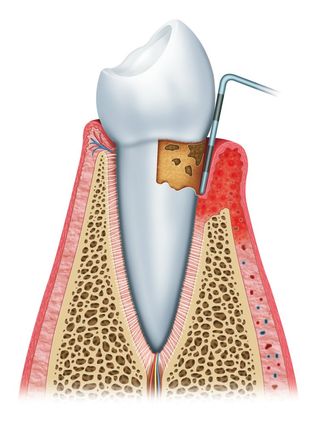Periodontics
Periodontics
Periodontal Procedures
Periodontal therapy includes both surgical and non-surgical techniques to restore health to the tissues that support the teeth (gums and bone) and prevent tooth loss.
- Scaling and Root Planing | These deep-cleaning techniques are the best starting point to control gum disease. Plaque and calculus (tartar) are removed from beneath the gum tissues, using hand scalers and/or ultrasonic instruments.
- Gum Grafting | Sometimes it is necessary to replace areas of lost gum tissue so tooth roots are adequately protected. This can be accomplished by taking healthy gum tissue from one area of the mouth and moving it to where it is needed, or by using laboratory-processed donor tissue.
- Periodontal Plastic Surgery | When used to describe surgery, the word “plastic” refers to any reshaping procedure that creates a more pleasing appearance, in this case, gum tissues.
- Periodontal Laser Treatment | Removing diseased gum tissue with lasers can offer significant advantages over conventional surgery, including; less discomfort and gum shrinkage.
- Crown Lengthening Surgery | This is a surgical procedure in which tooth structure that is covered by gum and bone tissue may need to be exposed either for cosmetic reasons or to aid in securing a new dental crown.
- Dental Implants | Today's preferred method of tooth replacement is a titanium dental implant, which is placed beneath the gum line and into the jawbone during a minor surgical procedure. The implant is then attached to a realistic-looking dental crown that is visible above the gum line and indistinguishable from a natural tooth.
If we maintain good oral hygiene and have regular professional cleanings and oral examinations, we may be able to keep our natural teeth for life. That involves not only caring for the teeth themselves, but also the structures that surround them: the gums and tooth-supporting bone. Gum disease, which is a bacterial infection, threatens these supporting tissues. That is why dental professionals are always on the lookout for early signs that patients may not notice. When signs of trouble become apparent, periodontal therapy may be suggested.
What does the phrase “oral health” mean to you?
No new cavities at your dental checkup? That's certainly part of it. But it's so much more than a lack of tooth decay. Good oral health means a mouth that's free from disease — which can range all the way from mild gingivitis (gum inflammation) to oral cancer. Simply put, oral health is a crucial component of your overall health and well-being.
It is important to realize that small — and readily treatable — problems in your mouth can become more complicated, painful, and expensive, if neglected for too long. Some of these oral health conditions may even have ramifications throughout the whole body. Gingivitis, for example, can sometimes progress to periodontitis — a more serious form of gum disease that can loosen teeth and cause them to fall out. Missing teeth can lead to bone loss in the jaw and inadequate nutrition. Numerous studies have shown that people with severe gum disease may be at increased risk for developing cardiovascular disease.

